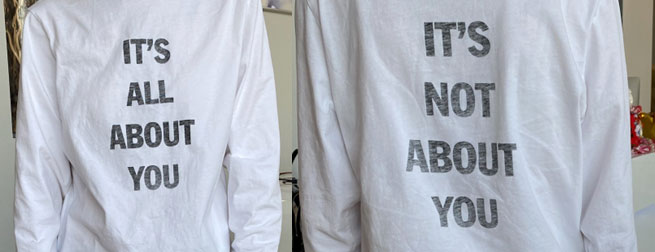
It’s funny how a simple message on a T-shirt can be humorous and not so funny at the same time.
I smiled when I saw a shirt recently and asked the wearer if I could take a picture. Thinking that was all there was to this moment, I was surprised when hours later I was still thinking about the messages on the T-shirt.
I began to question whether it is a well-intentioned gesture or a hostile act when someone interrupts a conversation or exchange by saying, “It’s not about you.” Is such an interjection meant to open new pathways to communication? Is it meant to focus both parties more directly and intently on the issue at hand?
I’m skeptical about whether bringing a person up short with such a statement is helpful in encouraging the receiver to see the situation from a different perspective. More than likely such a judgment shuts the receiver down in an unhelpful way making it awkward for the exchange to continue in an honest and authentic manner.
The tenor of the conversation changes as feelings unrelated to the original topic intervene. There may be feelings of shame or anger. More often than not, these feelings are pushed down and not shared because the person receiving the statement, “It’s not about you,” likely feels admonished. If this occurs, then it does become all about them.
How should one react when they are the recipient of such a judgment? One way to react might be to apologize for changing the focus of the conversation if that is indeed what happened. Another reaction might be to thank the person for bringing the conversation back to the appropriate focus, assuming the author of the statement knows what the focus should be.
But let’s be real. If there is a habit of only seeing the world from how it affects oneself, being told that “it’s not all about you” changes nothing about a self-centered person’s orientation. Instead, it likely changes the way the person feels about the person who made the observation or judgment.
Granted, there is a lot of ambiguity about the intention and the helpfulness of this statement, but what there is no doubt about is the negative impact of having that statement made if one is not acting in a selfish manner and genuinely wants to have a constructive conversation.
Bringing a person up short with such a statement might be a tactic that is regularly used to shut down a person who has the better argument or to discourage conversation altogether.
Which side of the t-shirt resonates with you? Do you live in a world where “it’s not about you,” or do you live in a world where “it’s all about you”? Does it depend? None of the above?

Which t-shirt would I rather wear: one sporting the slogan “It’s Not about You” or one announcing that “It’s All about You”? To be perfectly honest, neither slogan works for me.
From my perspective, each slogan represents one end of an “either-or spectrum,” neither opens the door to a meaningful exchange of ideas, and both contribute to this country’s increasingly intolerant, toxic, and “gotcha”culture.
“ IT’S ALL ABOUT US” is the slogan I would like to see on millions of t-shirts worn by Americans who are committed to listening and learning from one another, putting an end to the toxic political climate that is destroying our country, and working together to solve the very real problems facing this nation and the world.
I would proudly wear that shirt!
Maggie Culp
I hope more folks are thinking like you,